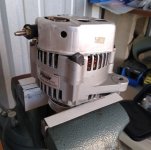johnpaul44
Member
Lycoming 0-360 with about 1000 hours. Recently replaced a cylinder with a new superior cylinder and I have about 4 or 5 hours on that cylinder. I noticed when the engine is hot if the prop is rotated i hear this strange creaking sound (see video). I only hear this when the engine is hot once it cools down a little bit the noise goes away. The propeller spins freely just like before, i borescoped the new cylinder and it looks perfect inside.
I asked my mechanic about this and he said sometimes superior cylinders make noises like this for the first 10 or 20 hours? is this really normal?
https://imgur.com/a/miMmdE1
I asked my mechanic about this and he said sometimes superior cylinders make noises like this for the first 10 or 20 hours? is this really normal?
https://imgur.com/a/miMmdE1





